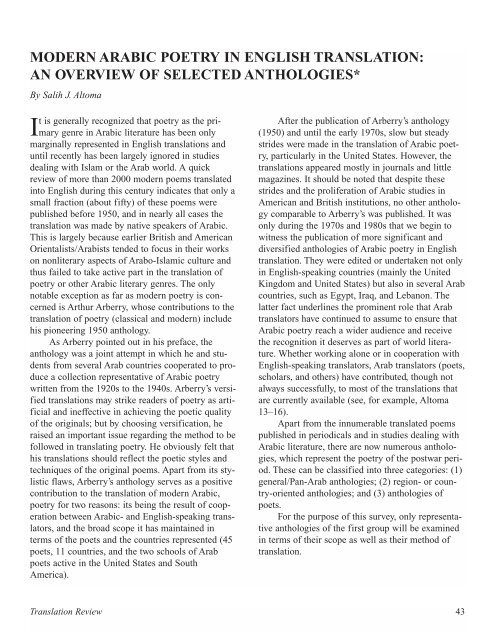Translation Review - The University of Texas at Dallas
Translation Review - The University of Texas at Dallas
Translation Review - The University of Texas at Dallas
Create successful ePaper yourself
Turn your PDF publications into a flip-book with our unique Google optimized e-Paper software.
MODERN ARABIC POETRY IN ENGLISH TRANSLATION:<br />
AN OVERVIEW OF SELECTED ANTHOLOGIES*<br />
By Salih J. Altoma<br />
It is generally recognized th<strong>at</strong> poetry as the primary<br />
genre in Arabic liter<strong>at</strong>ure has been only<br />
marginally represented in English transl<strong>at</strong>ions and<br />
until recently has been largely ignored in studies<br />
dealing with Islam or the Arab world. A quick<br />
review <strong>of</strong> more than 2000 modern poems transl<strong>at</strong>ed<br />
into English during this century indic<strong>at</strong>es th<strong>at</strong> only a<br />
small fraction (about fifty) <strong>of</strong> these poems were<br />
published before 1950, and in nearly all cases the<br />
transl<strong>at</strong>ion was made by n<strong>at</strong>ive speakers <strong>of</strong> Arabic.<br />
This is largely because earlier British and American<br />
Orientalists/Arabists tended to focus in their works<br />
on nonliterary aspects <strong>of</strong> Arabo-Islamic culture and<br />
thus failed to take active part in the transl<strong>at</strong>ion <strong>of</strong><br />
poetry or other Arabic literary genres. <strong>The</strong> only<br />
notable exception as far as modern poetry is concerned<br />
is Arthur Arberry, whose contributions to the<br />
transl<strong>at</strong>ion <strong>of</strong> poetry (classical and modern) include<br />
his pioneering 1950 anthology.<br />
As Arberry pointed out in his preface, the<br />
anthology was a joint <strong>at</strong>tempt in which he and students<br />
from several Arab countries cooper<strong>at</strong>ed to produce<br />
a collection represent<strong>at</strong>ive <strong>of</strong> Arabic poetry<br />
written from the 1920s to the 1940s. Arberry’s versified<br />
transl<strong>at</strong>ions may strike readers <strong>of</strong> poetry as artificial<br />
and ineffective in achieving the poetic quality<br />
<strong>of</strong> the originals; but by choosing versific<strong>at</strong>ion, he<br />
raised an important issue regarding the method to be<br />
followed in transl<strong>at</strong>ing poetry. He obviously felt th<strong>at</strong><br />
his transl<strong>at</strong>ions should reflect the poetic styles and<br />
techniques <strong>of</strong> the original poems. Apart from its stylistic<br />
flaws, Arberry’s anthology serves as a positive<br />
contribution to the transl<strong>at</strong>ion <strong>of</strong> modern Arabic,<br />
poetry for two reasons: its being the result <strong>of</strong> cooper<strong>at</strong>ion<br />
between Arabic- and English-speaking transl<strong>at</strong>ors,<br />
and the broad scope it has maintained in<br />
terms <strong>of</strong> the poets and the countries represented (45<br />
poets, 11 countries, and the two schools <strong>of</strong> Arab<br />
poets active in the United St<strong>at</strong>es and South<br />
America).<br />
After the public<strong>at</strong>ion <strong>of</strong> Arberry’s anthology<br />
(1950) and until the early 1970s, slow but steady<br />
strides were made in the transl<strong>at</strong>ion <strong>of</strong> Arabic poetry,<br />
particularly in the United St<strong>at</strong>es. However, the<br />
transl<strong>at</strong>ions appeared mostly in journals and little<br />
magazines. It should be noted th<strong>at</strong> despite these<br />
strides and the prolifer<strong>at</strong>ion <strong>of</strong> Arabic studies in<br />
American and British institutions, no other anthology<br />
comparable to Arberry’s was published. It was<br />
only during the 1970s and 1980s th<strong>at</strong> we begin to<br />
witness the public<strong>at</strong>ion <strong>of</strong> more significant and<br />
diversified anthologies <strong>of</strong> Arabic poetry in English<br />
transl<strong>at</strong>ion. <strong>The</strong>y were edited or undertaken not only<br />
in English-speaking countries (mainly the United<br />
Kingdom and United St<strong>at</strong>es) but also in several Arab<br />
countries, such as Egypt, Iraq, and Lebanon. <strong>The</strong><br />
l<strong>at</strong>ter fact underlines the prominent role th<strong>at</strong> Arab<br />
transl<strong>at</strong>ors have continued to assume to ensure th<strong>at</strong><br />
Arabic poetry reach a wider audience and receive<br />
the recognition it deserves as part <strong>of</strong> world liter<strong>at</strong>ure.<br />
Whether working alone or in cooper<strong>at</strong>ion with<br />
English-speaking transl<strong>at</strong>ors, Arab transl<strong>at</strong>ors (poets,<br />
scholars, and others) have contributed, though not<br />
always successfully, to most <strong>of</strong> the transl<strong>at</strong>ions th<strong>at</strong><br />
are currently available (see, for example, Altoma<br />
13–16).<br />
Apart from the innumerable transl<strong>at</strong>ed poems<br />
published in periodicals and in studies dealing with<br />
Arabic liter<strong>at</strong>ure, there are now numerous anthologies,<br />
which represent the poetry <strong>of</strong> the postwar period.<br />
<strong>The</strong>se can be classified into three c<strong>at</strong>egories: (1)<br />
general/Pan-Arab anthologies; (2) region- or country-oriented<br />
anthologies; and (3) anthologies <strong>of</strong><br />
poets.<br />
For the purpose <strong>of</strong> this survey, only represent<strong>at</strong>ive<br />
anthologies <strong>of</strong> the first group will be examined<br />
in terms <strong>of</strong> their scope as well as their method <strong>of</strong><br />
transl<strong>at</strong>ion.<br />
<strong>Transl<strong>at</strong>ion</strong> <strong>Review</strong> 43

















